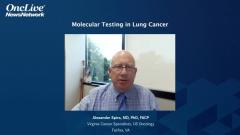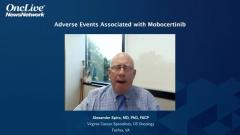
Adverse Events Associated With Mobocertinib
Common treatment-related adverse events associated with mobocertinib and other tyrosine kinase inhibitors, as well as management strategies are discussed.
Episodes in this series

Alexander Spira, MD, PhD, FACP: The major adverse events seen with mobocertinib are diarrhea and mucositis. Those are real adverse effects, and there’s a clear contingent of oncologists who describe this, that even grade 1 diarrhea on a daily basis—because remember, it’s a daily TKI [tyrosine kinase inhibitor]—is a real toxicity. Nevertheless, it appears to be manageable; it’s OK to reduce doses. We looked at the study, there were about 30% of patients who got a dose reduction. The starting dose is 160 mg, the first dose reduction is to 120 mg, but in general, it’s manageable with good care. Diarrhea is the major [adverse] effect, along with mucositis.
How do I mitigate the [adverse] effects? We’ve had a lot of clinical experience because we participated in the phase 1 clinical study, we put a lot of patients on. We generally mitigate them by early and often use of an antidiarrheal, such as Imodium or Lomotil. I don’t want to say we use them prophylactically, but at the first sign of diarrhea, we recommend using that.
TRANSCRIPT EDITED FOR CLARITY
















































